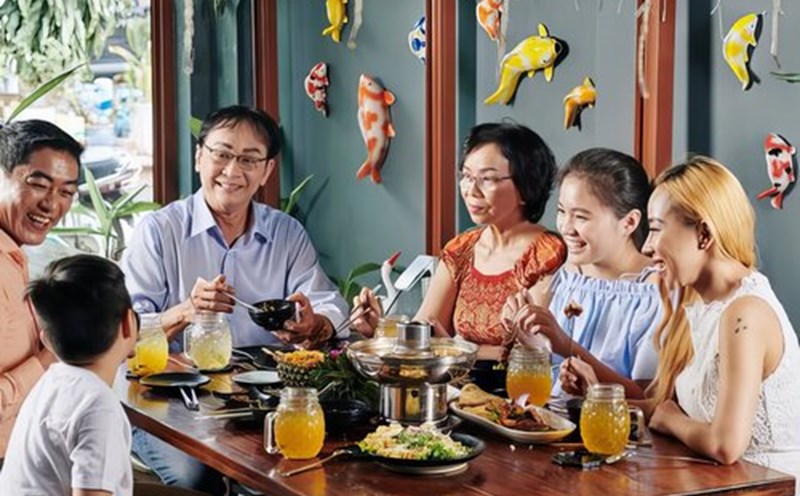But CNA Insider points out that the way the younger generation defines filial piety is changing in Singapore, in which filial standards such as allowances , living with parents when they get old...
Break free from traditional expectations
Caught between her parents' example and her own life goals, Xin Yi finds herself in a conflicted state. "My parents are very filial. They hired maids but still took very good care of my grandparents. My parents would not put them in nursing homes or similar places and I felt pressured to do that." Same for my parents" - the 23-year-old girl, the only child in the family, shared.
But Xin Yi also has her own desires. After witnessing her parents taking care of her grandparents, including cleaning, she felt she would be more comfortable hiring a nurse to take care of her parents in the future. This is why Xin Yi went to graduate school. “I need to study further to earn more money to cover all my parents' future needs if I want to have a stable life. When my parents' health weakens, I will have to pay for them to go to a nursing home, which is currently very expensive," she said.
Xin Yi's parents have not yet talked about their wishes. Tessa's parents, 27, told their four children: "You need to visit several times a week to show you care." For example, Tessa's sister is frequently asked why she doesn't visit “enough.” “There are so many expectations in a traditional family that you want to escape,” said Tessa, who plans to visit her parents every two weeks.
In recent years, there has been growing debate about filial norms in Singapore. For Xin Yi, Tessa and other young people CNA Insider spoke with, it's not a matter of giving up duty but of wanting to show filial piety in other ways. Tessa heard her older siblings talk about her parents' expectations when she started working, that "we need to pay back the college tuition and send allowance to our parents". Therefore, she sent her parents about 10% of her income even though she did not want to.
Living with or staying close to elderly parents to care for them may also not be a top priority for many Millennials and Gen Zers. Sarah Ridzwan, 23, works at an advertising agency and has intending to work abroad, she understood that there would have to be an appropriate way to show filial piety. “If I can afford a plane ticket, I will visit my mother every few months. If it's more difficult, I will video call her every month" - she said.
Ryan Aw, 21, a student at Nanyang Technological University (NTU), who also wants to work abroad, shared, "It's not necessarily true that young people are less involved in their parents' lives than before. evil". He explains: "I believe that parents want their children to succeed and both sides have to make a certain level of concessions to achieve this."
The male student has a younger brother whose parents are over 60 years old and are "still very independent". When his parents get older, "I will see what is most feasible and do it". "My respect and gratitude for my parents is what defines my filial piety, not physical closeness," Ryan Aw emphasized.
Prepare in advance for the change
According to research on filial piety compiled by Associate Professor of Sociology - Shannon Ang of Nanyang Technological University, life in Singapore has changed significantly. The average household size in Singapore decreased from 4.87 members in 1980 to 3.09 in 2022. Average monthly income from work for permanent households increased from S$4,000 in in 2000 to S$8,615 in 2022. “People have benefited from Singapore's economic growth over the past few decades. Therefore, middle-class people tend to be relatively independent" - said scholar Bussarawan (Puk) Teerawichitchainan, National University of Singapore.
Among the parents of the Gen “I plan to be independent until the day I die. So I will stay healthy and stay busy,” the 47-year-old man said. He affirmed that he does not expect his children to receive benefits when he gets old.
Ian YH Tan is not the only parent with this view. Dora Yip - a 47-year-old parent of two Gen Z children - said: “I am trying to ensure that I have enough financial capacity to pay for any type of care that I need when old age". She plans to pay for institutional care herself, although she hopes to not have to use this option.
However, the increasing number of middle-class parents like Mr. Tan and Ms. Yip is not the only reason why Singapore's younger generation is changing their views on filial piety, according to CNA. Along with economic growth, Singapore's international mobility has also increased. According to data from the United Nations, Singapore's number of migrants increased from 156,000 in 1990 to 348,000 in 2020. Previously, "not living with elderly parents was almost like abandoning them", but now, these Three-generation families are "harder to find because children move around more", Professor of Practical Sociology - Paulin Straughan of Singapore Management University confirmed.
In 2022, 36.2% of residents
Singaporeans aged 25 and over are university graduates, up from 4.5% in 1990. This also explains why "people are less likely to accept things as they are", he said. Shannon Ang pointed out. In addition to demographics, the Parental Protection Act in Singapore has also undergone changes over the years. In 2023, the law was amended so that parents who abuse, abandon or neglect their children may not be allowed to seek financial support from their children. “Theoretically, filial piety is unconditional. But now, the law is changing and there are conditions attached," Mr. Shannon Ang noted. According to him, a more significant change began in 2015, when one in eight Singaporeans was aged 65 or over and the Action Plan for Successful Population Aging was launched. The plan calls for a “shift to personal responsibility” for older people to become less dependent on care from their contemporaries. "For the longest time, filial piety was a strategy we used to shoulder the burden of caring for the elderly. But now, the elderly don't have as many children anymore and health care costs are much higher " - Mr. Shannon Ang noted.
In addition to the issue of aging, Nanyang Technological University Associate Professor Shannon Ang predicts that there will be changes in the parent-child relationship. "I think we're going to move from a hierarchical parent-child relationship to a slightly more egalitarian relationship," he said.
There are no expectations from Mrs. Dora Yip for the care of her children in old age. She emphasized: “Filial piety is not a transaction. I just want us to be a positive part of each other's lives." Similarly, what is important to Mr. Ian YH Tan is a deeper relationship with his children. Meanwhile, the younger generation like Ryan Aw emphasized: “The traditional perception of filial piety no longer applies to our world.”











